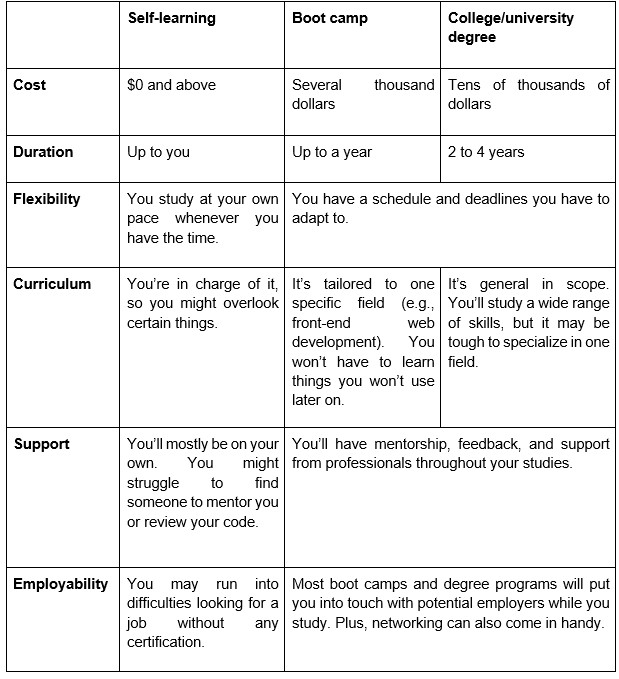So, you want to learn programming. Maybe, it’s to switch careers later on; maybe, you want it to become your first and only profession. Considering how many online tutorials and books are available these days, it should be an easy feat, right?
Well, not exactly. It’s akin to going back to school for a year or more. That is, prepare for it to be time-consuming and to require a lot of effort on your part.
The good news is, it’s not impossible to master programming, no matter when you start – while you’re in high school or after you turn 30. What matters, however, is your approach.
So, let friendly programmers at Develux break down four time-tested steps towards becoming a pro coder. And yes, there’s going to be a review of three ways to learn programming too.

Narrow Down Your Learning Goals
Let’s start with one simple truth: there are no “programmer” jobs out there. Programming is an umbrella term that covers fields from AI and machine learning to game and web development.
Plus, there are more than 100 programming languages out there. That’s not even to mention hundreds of frameworks, libraries, and IDEs.
Obviously, you can’t master all of them. You don’t need to, either. So, reflect on what field of programming you want to get involved in first.
Got your answer? Great! Now, take time to ponder these four questions – they’ll help you formulate your learning goals.
- What do you want to be doing when you code? Would you prefer back-end or front-end tasks – or, maybe, you’d like to become a full-stack developer?
- What types of projects do you see yourself working on (in terms of size and industry)?
- If you have some real-world examples of such projects in your mind, what languages/frameworks/libraries were they created with?
- Look through the job postings for entry-level positions you’re interested in. What skill requirements do you see most frequently?
“I Want to Do X/Y/Z. What Should I Learn?”
If you’d like to have a shortcut for the questions above, here’s a mini-guide to the most popular languages, frameworks, and other technologies:
- Android mobile apps – Java and Kotlin;
- iOS mobile apps and macOS apps – Swift;
- cross-platform mobile apps – React Native (a JavaScript framework), Xamarin (a C# framework), Flutter (a Dart framework);
- web apps (front-end) – JavaScript, HTML (a markup language) and CSS (a style sheet language);
- web apps (back-end) – Ruby, Python, Java, PHP;
- Windows apps – C, C++, C#, .NET framework;
- data science, AI, and machine learning (ML) – Python, R, SQL;
- game development – Unity (C#), Unreal Engine (C++).
3 Ways to Learn Programming: Make Your Choice
These are the three basic ways to learn programming:
- self-learning;
- enrolling in a boot camp (i.e., an intensive training program);
- obtaining a degree in computer sciences.
Each of these approaches comes with its pros and cons, of course. Here’s a comparison table that’ll help you make your choice.

In case you’ve settled on self-learning as your way to master the chosen skillset, here are the top free websites that you should check out.
- CodingBootcamps. This service allows you to browse different coding bootcamps from a variety of different subjects at different price points in different areas. You are certain to find an option that works for you!
- freeCodeCamp. It boasts a free 3,000-hour curriculum and awards certifications for free. As for the range of specializations, there are 10 of them, from responsive web design to ML with Python.
- Codecademy. Another heavyweight on the list, Codecademy, has courses on 12 subjects ranging from code foundations to game development and cybersecurity.
- EdX. You can find Harvard’s famous CS50 here. In case you haven’t heard of it, it’s a great introductory course to the basics of computer science. There are also courses on Python from IBM and MIT, AWS from Amazon, R basics from Harvard, and more.
- Coursera. This platform is home to online courses on data analytics from Google, data science from IBM, ML from Stanford University, and many more.
Practice, Practice, Practice
Whichever option you choose, one thing always remains true for programmers-in-training. You’ll have to spend hundreds of hours in front of your computer polishing off your skills down to the nitty-gritty.
Here’s just a scoop of what you can do for practice:
- volunteer your skills for open-source projects;
- take up coding challenges (you can find tons of them online);
- participate in hackathons and competitions;
- come up with your own side projects.
Remember to keep it simple at first, however. While you take your first steps in web development, for example, don’t try to create the next Facebook. Focus on simple one-page projects instead.
Prepare for a Long-Lasting Commitment
If someone promises to show you ways to learn programming in a couple of months, don’t trust that person or website. Under the very best of circumstances, it’ll take you half a year to a year of hard work to become confident in your skills.
So, strap in for a long ride. Here are three tips for making the most out of it.
- Schedule your study sessions. Whether you learn on your own or study for an exam, make sure you dedicate enough time to it. Building skills isn’t an overnight feat.
- Keep your motivation alive. Now and then, remind yourself what drove you to learn programming in the first place.
- Seek advice. Mentorship isn’t just a fancy word; it’s a necessity if you want to become proficient in this craft.

In Conclusion: What Makes a Good Developer?
Anyone can learn programming. But that’s not exactly the point. Your goal should be to code well. But what does that mean?
Here are five things that set apart great developers from everyone else.
- They consistently write clean code. How to write clean code is a huge topic on its own, but here’s a rule of thumb: it should be as easy to read and understand as a text in English.
- They don’t copy and paste their code, either. Instead, they use classes to avoid repetition.
- They have mastered their googling skills. It’s not the end of the world if you don’t know the solution to every problem you encounter. What matters is how you resolve it.
- They have mastered the computer science basics. They know how to apply the programming logic and create effective algorithms in pseudo-code. So, make sure you have data structures, complexity theory, and algorithms in your curriculum.
- They use Git like a pro. There’s nothing more irritating than merge conflicts that could’ve been avoided.
So, don’t strive to become just another developer – aim to become a good one. Good luck!







